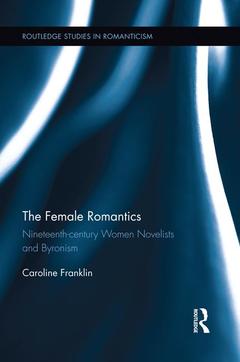The Female Romantics Nineteenth-century Women Novelists and Byronism Routledge Studies in Romanticism Series
Auteur : Franklin Caroline

Awarded the Elma Dangerfield Prize by the International Byron Society in 2013
The nineteenth century is sometimes seen as a lacuna between two literary periods. In terms of women?s writing, however, the era between the death of Mary Wollstonecraft and the 1860s feminist movement produced a coherent body of major works, impelled by an ongoing dialogue between Enlightenment ?feminism? and late Romanticism. This study focuses on the dynamic interaction between Lord Byron and Madame de Staël, Lady Morgan, Mary Shelley and Jane Austen, challenging previous critics? segregation of the male Romantic writers from their female peers.
The Romantic movement in general unleashed the creative ambitions of nineteenth-century female novelists, and the public voice of Byron in particular engaged them in transnational issues of political, national and sexual freedom. Byronism had itself been shaped by the poet?s incursion onto a literary scene where women readers were dominant and formidable intellectuals such as Madame de Staël were lionized. Byron engaged in rivalrous dialogue with the novels of his female friends and contemporaries, such as Caroline Lamb, Mary Shelley and Jane Austen, whose critiques of Romantic egotism helped prompt his own self-parody in Don Juan. Later Victorian novelists, such as George Sand, the Brontë sisters and Harriet Beecher Stowe, wove their rejection of their childhood attraction to Byronism, and their dawning awareness of the significance for women of Lady Byron?s actions, into the feminist fabric of their art.
1. Aristocratic Romanticism: Women travellers, Byron and the Gendering of Italy 2.‘Thunder Without Rain’: Mary Shelley, Byronic Prometheanism and Romantic Idealism 3. Cutting The Corsair down to size: Lady Caroline Lamb’s Ada Reis and George Sand’s L’Uscoque 4. ‘The interest is very strong, especially for Mr Darcy’: Jane Austen, Byron and romantic love 5. "My voice shall with thy future visions blend": Byron’s daughters, Lady Byron and Anne Brontë’s The Tenant of Wildfell Hall 6. "Happiness is not a potato": Byron, Belgium and the romantic feminism of Charlotte Brontë’s Jane Eyre and Villette 7. Harriet Beecher Stowe’s Romantic racism and her pathology of Byronic Masculinity
Date de parution : 04-2015
15.2x22.9 cm
Disponible chez l'éditeur (délai d'approvisionnement : 14 jours).
Prix indicatif 58,78 €
Ajouter au panierDate de parution : 09-2012
15.2x22.9 cm
Disponible chez l'éditeur (délai d'approvisionnement : 14 jours).
Prix indicatif 172,36 €
Ajouter au panierThème de The Female Romantics :
Mots-clés :
Young Man; childe; Curtain Lectures; harold's; Silver Fork Fiction; pilgrimage; Myth’s Endorsement; don; Wild Man; juan; Litchfield Female Academy; byronic; Don Juanism; hero; Oriental Tale; nineteenth; John Fox; century; Nineteenth Century Women Novelists; women; Oldtown Folks; political freedom; Contemporary Society; Romantic movement; Wildfell Hall; Lady Byron's actions; Bm Satire; nineteenth-century female novelists; Byron’s Giaour; Childe Harold’s Pilgrimage; Mary Wollstonecraft; Wild Irish Girl; Arthur Huntingdon; Lady Caroline Lamb



